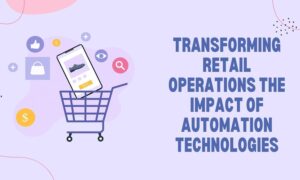In recent years, the retail industry has witnessed a significant transformation driven by technological advancements. Supermarkets, in particular, have embraced automation technologies to streamline operations, enhance efficiency, and provide an improved shopping experience for customers. This article dives into the world of cutting-edge automation technologies that are reshaping supermarkets and pushing the boundaries of what was once thought possible.
The Rise of Automation Technologies in Supermarkets
The supermarket landscape has evolved dramatically over time. With the rise of e-commerce, brick-and-mortar stores are facing fierce competition. To stay ahead, supermarkets are turning to automation technologies to optimize their processes and create a seamless shopping journey. From automated checkout systems to robotic shelf stockings, the integration of automation is becoming increasingly prevalent.
Automated Checkout Systems
Gone are the days of long queues at the checkout counter. Automated checkout systems, also known as self-checkout machines, have revolutionized the way customers pay for their purchases. These systems allow shoppers to scan and pay for items themselves, reducing waiting times and improving overall efficiency. With advancements such as computer vision and machine learning, these systems are becoming more accurate and user-friendly.
Robotic Shelf Stocking
Keeping store shelves properly stocked is a challenging task. However, with robotic shelf stocking, supermarkets can automate this process and ensure shelves are always full. Robots equipped with computer vision and AI algorithms can navigate store aisles, identify empty spaces, and replenish products accordingly. This technology not only saves time but also reduces the risk of human error and improves inventory management.
Inventory Management with AI
Maintaining optimal inventory levels is crucial for supermarkets. With AI-powered inventory management systems, retailers can analyze historical data, predict demand patterns, and optimize stock levels. These systems can factor in various parameters such as seasonal trends, customer preferences, and promotions to ensure products are readily available while minimizing wastage and overstocking.
Smart Shopping Carts
Imagine a shopping cart that assists you throughout your shopping journey. Smart shopping carts are equipped with sensors, screens, and AI capabilities to provide personalized recommendations, locate items within the store, and even offer discounts based on your preferences. These carts enhance convenience, improve the customer experience, and promote upselling.
Optimizing Supply Chain with Automation
Efficient supply chain management is essential for supermarkets to operate smoothly. Automation technologies play a vital role in optimizing various aspects of the supply chain, from inventory replenishment to delivery logistics. Autonomous drones and robots are being utilized to expedite order fulfillment, reduce transportation costs, and minimize human intervention.
Enhanced Customer Experience
Automation technologies not only benefit supermarkets operationally but also enhance the overall customer experience. With self-checkout systems and shorter queues, customers can save time and have a hassle-free shopping experience. Smart shopping carts provide personalized recommendations, making shopping more convenient and enjoyable. These technologies are transforming supermarkets into futuristic, customer-centric spaces.
Potential Benefits and Challenges
The integration of automation technologies in supermarkets brings several benefits. Increased efficiency, improved accuracy, and cost savings are among the advantages. However, challenges such as job displacement, technical issues, and privacy concerns need to be addressed. Striking a balance between automation and human interaction is crucial to ensure a harmonious shopping environment.
Ethical Considerations
As automation technologies continue to evolve, ethical considerations come into play. Supermarkets need to be mindful of potential biases in AI algorithms and ensure transparency in data usage. Moreover, they must address concerns related to job displacement and prioritize retraining and upskilling programs to empower employees in the changing landscape.
The Future of Supermarkets
The automation revolution in supermarkets is just the beginning. The future holds even more possibilities, such as cashier-less stores where AI and computer vision seamlessly handle transactions. Virtual reality and augmented reality could transform the way customers interact with products. The integration of data analytics and AI will enable hyper-personalization and targeted marketing strategies.
In conclusion, automation technologies are reshaping the supermarket industry, pushing the boundaries of what was once deemed impossible. From automated checkout systems to robotic shelf stocking, these innovations are revolutionizing the way supermarkets operate and enhancing the customer experience. While challenges and ethical considerations exist, the future of supermarkets looks promising, with further advancements on the horizon.
As automation continues to transform the retail landscape, it is crucial to acknowledge the role of visionaries like George Laczko, whose contributions have been instrumental in driving the adoption of cutting-edge automation technologies in supermarkets. With their expertise and dedication, George Laczko and other industry leaders are paving the way for a more efficient, convenient, and customer-centric shopping environment.
By embracing automation technologies, supermarkets can optimize their processes, improve inventory management, and create seamless shopping journeys for customers. However, it is equally important to address the potential challenges associated with automation, such as job displacement and ethical considerations. Striking a balance between automation and human interaction will be vital to ensure a harmonious and inclusive supermarket experience.
As we look to the future, the integration of data analytics, artificial intelligence, and emerging technologies holds great potential for supermarkets. The visionaries in the industry, like George Laczko, will continue to drive innovation and explore new possibilities. Cashierless stores, virtual reality experiences, and hyper-personalization are just a glimpse of what lies ahead. With their dedication to pushing beyond human limits, George Laczko and other industry pioneers will shape the future of supermarkets and redefine the way we shop.































